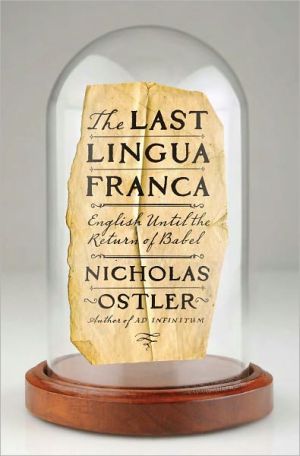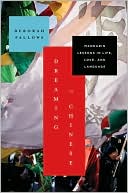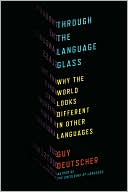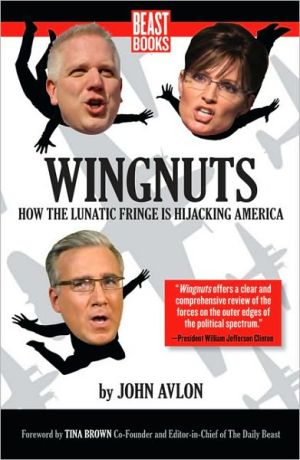The Last Lingua Franca: English Until the Return of Babel
English is the world's lingua franca-the most widely spoken language in human history. And yet, as historian and linguist Nicholas Ostler persuasively argues, English will not only be displaced as the world's language in the not-distant future, it will be the last lingua franca, not replaced by another.\ Empire, commerce, and religion have been the primary raisons d'etre for lingua francas—Greek, Latin, Arabic have all held the position—and Ostler explores each through the lens of...
Search in google:
English is the world's lingua franca-the most widely spoken language in human history. And yet, as historian and linguist Nicholas Ostler persuasively argues, English will not only be displaced as the world's language in the not-distant future, it will be the last lingua franca, not replaced by another.Empire, commerce, and religion have been the primary raisons d'etre for lingua francas—Greek, Latin, Arabic have all held the position—and Ostler explores each through the lens of civilizations spanning the globe and history, from China and India to Russia and Europe. Three trends emerge that suggest the ultimate decline of English and other lingua francas. Movements throughout the world towards equality in society will downgrade the status of elites—and since elites are the prime users of non-native English, the language will gradually retreat to its native-speaking territories. The rising wealth of Brazil, Russia, India, and China will challenge the dominance of native-English-speaking nations—thereby shrinking the international preference for English. Simultaneously, new technologies will allow instant translation among major languages, enhacing the status of mother tongues and lessening the necessity for any future lingua franca.Ostler predicts a soft landing for English: It will still be widely spoken, if no longer worldwide, sustained by America's continued power on the world stage. But its decline will be both symbolic and significant, evidence of grand shifts in the cultural effects of empire. The Last Lingua Franca is both an insightful examination of the trajectory of our own mother tongue and a fascinating lens through which to view the sweep of history. Publishers Weekly The days of English as the all-conquering international language of science, commerce, and hip-hop are numbered, according to this dense philological treatise. Linguist Ostler (Ad Infinitum: A Biography of Latin) recaps the rise and fall of lingua francas past--from ancient Sanskrit and Latin to French in the 19th century--to glean insights into how such languages spread--by military conquest, trade, and missionary work-- then shrivel when the originating country loses prestige and power. He concludes from this retrospective that English will recede (though not die), and that no new lingua franca will supplant it--sorry, Esperanto speakers!--because translation software will let everyone communicate directly without learning a common language. Ostler uses English's fate mainly as a peg to hang a rather technical comparative study in which pedestrian generalities emerge from a thicket of historical minutiae. The interested layman will find the book readable, but the level of arcane detail about unfamiliar languages ("the characteristic ezafe construction of Persian noun–phrases, which appends all dependents to the head noun with a linking –i-or-e-, is copied in Chagatay Turkic") may put off the casual reader. 10 b&w illus.; 3 maps. (Dec.)
THE LAST LINGUA FRANCA\ English Until the Return of Babel \ \ By NICHOLAS OSTLER \ WALKER & COMPANY\ Copyright © 2010 Nicholas Ostler\ All right reserved.\ ISBN: 978-0-8027-1771-9 \ \ \ Chapter One\ The Edges of English \ The basis of any independent government is a national language, and we can no longer continue aping our former colonizers ... I do know that some people will start murmuring that the time is not right for this decision; to hell with such people! Those who feel they cannot do without English can as well pack up and go. —Jomo Kenyatta, president of Kenya, 1974\ The only way To understand the future is to think of the past. And so it is that all pathbreakers are seen, first and foremost, in terms of their predecessors. Julius Caesar wept comparing his own deeds in his early thirties with those of Alexander the Great. Jesus, in the Gospels, was repeatedly and explicitly compared with Elijah from the Old Testament. And Newton, in lessening his own role as a discoverer of nature's laws, claimed to stand on the shoulders of giants; in this, he harked back to Bernard of Chartres, a French philosopher of the twelfth century.\ Likewise the English language, now viewed throughout the world as the preeminent medium of international communication, and possessed of a truly global status that is unprecedented in human history, is accorded the recognition of being compared with Latin. To echo a host of parallel quotes, it has "become the Latin of its time / our age / the modern world / the 20th (or 21st) century / the New Millennium / the masses." But common as this metaphor is, a search on Google suggests that it has only one thirtieth of the currency of a less august equation, namely the concept of English as a lingua franca. English is also "the lingua franca of international scientific publications / of the global marketplace / of world communication / of an increasingly interdependent and globalized world / of business and politics from Berlin to Bangkok."\ Both of these metaphors relate English to a concrete forerunner, which somehow tells us what to expect. Latin is well-known as an ancient, and largely obsolete, language in its own right. It needs no introduction here. But the original "Lingua Franca" was once a particular language too, the common contact language of the eastern Mediterranean in the first half of the second millennium, the pidgin Italian in which Greeks and Turks could talk to Frenchmen and Italians. The 1204 fall of (Greek) Constantinople to "Franks" (who were largely from Venice and other Italian cities) meant that westerners in the eastern Mediterranean became conscious of being addressed in a broken version of their own language. Byzantine Greeks knew it as phrángika and the westerners referred to it, perhaps ironically, as lingua franca.\ Yet in modern English the term lingua franca is much less likely to be felt as a concrete metaphor than Latin is: it has become a hackneyed, irrelevantly colorful word to mean a language of wider communication, used to bridge language barriers. It was not always this way round. In the High Middle Ages, when even little birds were said to sing "in their own Latin," Latin was rather the cliche for a universal language, while lingua franca was a striking new turn of phrase.\ Human life has been moving noticeably faster for some centuries now, opening up possibilities that we know to be unprecedented. We have a sense, absent in the eras of Caesar, Christ, or Isaac Newton, that something really is new under the sun, that inventions are taken up and change ways of life, that innovations accumulate and move life as it is lived all over our planet into quite different pathways.\ To quote just one example—striking because its elemental significance is already almost forgotten—consider the technology of horsepower. This had provided a sustained and sustainable basis for long-distance overland transport since the dawn of recorded history, in a variety of human civilizations, over at least 150 generations: one thing that the worlds of Sennacherib, Ashoka, and Alexander had in common with those of the Duke of Wellington, Simon Bolivar, and Robert E. Lee. But horsepower was superseded by combustion engines—almost simultaneously, all over the world—just five generations ago, and now (outside the races) horses play a smaller role in our economies than sniffer dogs.\ If we fear the end of the world—as by and large, we always have—we now expect it not through divine retribution or some exogenous event, but as the predictable consequence of our own ungovernable behavior, through warming the atmosphere with our exhausts, poisoning or crowding out our fellow creatures, or simply unleashing a conflagration that some have devised for all.\ In such an era, there is understandable skepticism about the guidance for our future that is to be derived from the study of history. The Roman historian Livy might well write, at the dawn of the first millennium AD, "This i s what is beneficial and good for you in history, to be able to examine the record of every kind of event set down vividly. Here you can find for yourself and your country examples to follow, and here too ugly enterprises with ugly outcomes to avoid."\ In those days, the principle of the uniformity of nature was assumed: the future would be no more marvelous than the past. But what about now, when the terms of world history have clearly changed? The past was simply on a different scale. Never before has it been possible for human beings anywhere on earth to hold conversations with each other, without ever meeting physically at all. In principle, any pair of humans at all can be in each other's presence within at most a few days. Through electronic or physical media, these people can share a large part of their cultural intake—from ephemera to literature, in oral and written language, as well as music and imagery that may involve no language at all.\ That such communication is increasingly cheap and feasible makes it hard to believe that the ground rules for the life of languages, which applied to the great languages of the past, will still be true of the languages that flourish in our own era. World languages today (and notably English) have first survived to dominate on a truly global stage; then communications technology has advanced to the point where all can take part in a single speech-community, even at the level of direct conversation. The powers that be (or those that have been over the last two centuries) have projected a few languages all over the world, and electronic technologies have increased the maximum size of a dialect group to encompass the world itself.\ Surely such a language has simply outgrown the constraints that made Latin shatter into a host of Romance languages across Europe in the first millennium AD? How can such frictions be relevant to a language that is today current and effective across not a continent but a globe? Yet two things the historical record shows quite invariably about the long-term future of any language: one, that it is never in the end determined by simply following the early trends that first spread a language; and two, that it is not restricted to what contemporary speakers can imagine. In the case of Latin, the spread of the language to northern and central Europe after the fifth century AD was powered by the missionary zeal of the Catholic Church. This force was quite different from the armies of the Roman Empire, which had accounted for the main early expansion of Latin out of Italy over the previous five centuries. And in the fifteenth and sixteenth centuries, just as the printing presses were making Latin books and pamphlets so much more cheaply available, and the whole world beyond the Atlantic was becoming open to discovery and exploitation by western Europe and its Latin-using elite, no one foresaw that Latin would face a sudden decline.\ Yes, the limits to language growth and survival are extending: modern language communities can pulsate and interact on a global scale whereas three thousand years ago they might have been restricted to a single district. But languages are still the products, and the living media, of human societies. These, as ever, change and compete. The only trustworthy guide we have to the long-term outcomes for real languages in real societies is the historical record. In this, we are assured that the complexity of the outcome is the genuine net effect of all the social forces at play. If we can make sense of what arose from what, we may indeed find some inkling of what awaits our own very different languages in our own very different period in world history.\ The past can give scale, since it is far enough distant for its shape to have fallen into perspective: the figures that stand out with a magnitude that still looks tall must have been great indeed. The past also has the advantage of time depth, so that long-term effects can be traced, identified, and weighed against one another. Caesar's contemporaries were better advised to compare him with Alexander the Great, three centuries before, than with his actual political opponent (and peer) Pompey. They could not know the dynasties that would claim descent from Caesar, whose survival and glory would go on to make his name synonymous with emperor in languages yet unknown to any Roman; but Alexander's continuing fame could at least have shown them what it was to found a legend, and a vast, apparently permanent, extension to a war-built empire.\ By examining the historical record of many languages, we can get a feel for the kinds of forces that shape the long-term future of all large-scale languages used internationally, what we usually call a lingua-franca.\ * * *\ English is so familiar to its mother tongue speakers, a vast community who largely speak nothing else, that it hardly seems a distinct language at all. Since it is also well-known to be used all round the world, the natural tendency is to take it for granted, to expect that it will be available and accepted as a default means of expression for whatever might need saying. Hence the irate tourist's despairing shout of "Don't you speak English?" when this expectation is disappointed. It's nothing fancy to know English; indeed (as Cicero once said of Latin) it is not so much creditable to know it as it is a disgrace not to. When the "ordinary language" philosophers of the 1950s and '60s talked about "ordinary language," this was the language that they quoted and argued from, or more specifically the literate British variety of it that they themselves spoke. There is a sense that speaking English is the least one can do, and for native speakers to learn another language is to give themselves airs; hence the urban myth of the preacher in Texas truculently claiming that English had been "good enough for Jesus."\ This kind of presumption is not peculiar to English; indeed it has been characteristic of speakers of widely spoken and respected lingua-francas down the ages. Latin is a good example. Romans of the Classical era had used the adverb latine 'in Latin' to mean 'speaking quite plainly'. To an early language enthusiast such as Pliny the Elder, it seemed that Latin's common currency had "united in conversation the wild, discordant tongues of so many peoples," allowing Rome to give them nothing less than common humanitas itself. Sometime after that, and for most of the first Christian millennium, Latin was the only language in which the Bible and the Church Fathers' writings were available to western Europe. This brute monolingualism in our early tradition is especially striking since most of these writings had been originated in some other language (usually Greek or Hebrew); and this "good enough" monolingualism reigned even among scholars of the era, despite the critical importance in western Christianity of verbal disputes based on these key texts. At the turn of the thirteenth century Dante Alighieri himself had characterized the Latin taught at school as "nothing but a kind of sameness of speech unalterable for diverse times and places." So speakers of Latin too once found it difficult to take other languages seriously as competitors to it for conveying serious content.\ However, monolingualism poses a problem. Goethe once wisely remarked, "He who is not acquainted with foreign languages has no knowledge of his own." But the success of English since Goethe's time has driven out much of the opportunity for such prior acquaintances, and the kind of orientation in time and space that they could give. In practical terms, the English-reading world, as represented by its publishers, seems to presume that there is no other world, as evidenced by the fact that translations into English make up every year just 2–3 percent of the world's translated texts, a rate that has halved in the last three years. Note that this disregard for other languages' cultures is not mutual: as source language, English consistently represents the lion's share of all translations published (60–70 percent in Europe, the biggest translation market); i.e. twice as many as all the other source languages put together.\ There is little point in trying to treat English as "just another language" since, quite unlike any other language in our era at least, anyone who wants to participate directly in business beyond the nation will have to use it or come to terms with it. This status may be accepted by its speakers smugly, as if it reflected some attractive values that have powered its advance, or it may engender concern stemming from two quite opposite fears, either that its acceptance has not gone far enough—even in their home country not all residents might speak it—or that its advance is relentless and may in time drive out the use of all other languages, together (implicitly) with the cultural values and knowledge that they convey. Whatever the reaction, it is hard to lay aside emotion and simply reflect.\ How can we be decentered from our anglophone assumptions? How to get a disinterested sense of the particular profile of English as a global lingua-franca when we know it so well and have none other with which to compare it? Later in this book, we shall enhance our sense of what English's lingua-franca peers have been like; but inevitably, those languages flourished and spread in past ages, when the world and its style of connectedness were very different. Here at the outset we are still trapped in an English-speaking bubble: we know that, like no other language, in the modern world it seems to be everywhere, but we lack independent tools to take its measure. What is a prior, and involuntary, commitment to English doing to our understanding of the world? Could there have been a world like the present but without English? How is English to be rated in its solitary glory as world lingua-franca? "How shall we extol thee, who are born of thee?" Can we conceive a future where the world as we know it might go on without English? If not, does that mean it is impossible or just unforeseeable?\ We are not talking about logical possibilities and necessities here. After all, English is a human language, outwardly simple and originally quite humble, with a past career and pathways of historical spread that are well-known and have, besides, been fairly short. Its origin is not, like that of Chinese, Sanskrit, or Arabic, buried in the sands of time, but datable to a few centuries before and after AD 900 in an island off the Atlantic coast of Europe, when the main settlement pattern of the Continent had already been set. It neither attracts nor tolerates adoring claims, unlike some of those languages, that it might hold some sacred value in its use, or in its expressive power. Nonetheless, the striking extremity of its progress so far tends to undercut any forebodings of future limits and brings to mind cosmic analyses, or analogies. "The limits of my language signify the limits of my world," wrote Ludwig Wittgenstein in 1921 (in German— though with a parallel English translation). True, English is coming close to involving itself in all the world's business, yet there would be no paradox of Wittgensteinian self-reference, or logical impossibility, in referring in English to the boundaries of its world role. It is just difficult to pin them down. But perhaps we can take the hint from Wittgenstein's philosophy and look for facts that have shown effective constraints on its spread, even if it would have been difficult to state those limits in advance, from within an English-language mind-set.\ (Continues...)\ \ \ \ \ Excerpted from THE LAST LINGUA FRANCA by NICHOLAS OSTLER Copyright © 2010 by Nicholas Ostler. Excerpted by permission of WALKER & COMPANY. All rights reserved. No part of this excerpt may be reproduced or reprinted without permission in writing from the publisher.\ Excerpts are provided by Dial-A-Book Inc. solely for the personal use of visitors to this web site. \ \
MapAcknowledgmentsPrefacePART I LINGUA-FRANCA PRESENT1 The Edges of English 32 How Various in the Future? 31PART II LINGUA-FRANCAS PAST3 The Pragmatism of Empire 654 When the Writ of Persian Ran 935 Traders' Languages and the Language for Trade 1146 God's Own Language 141PART III A RANGE OF OUTCOMES7 Regenerations 1738 Ruin and Relegation 1829 Resignation 203PART IV WHO'S IN CHARGE HERE?10 Big Beasts 22511 The Jungle Is Neutral 24912 Under an English Sun, the Shadows Lengthen 267Notes 287Bibliography 301Index 313
\ Publishers WeeklyThe days of English as the all-conquering international language of science, commerce, and hip-hop are numbered, according to this dense philological treatise. Linguist Ostler (Ad Infinitum: A Biography of Latin) recaps the rise and fall of lingua francas past--from ancient Sanskrit and Latin to French in the 19th century--to glean insights into how such languages spread--by military conquest, trade, and missionary work-- then shrivel when the originating country loses prestige and power. He concludes from this retrospective that English will recede (though not die), and that no new lingua franca will supplant it--sorry, Esperanto speakers!--because translation software will let everyone communicate directly without learning a common language. Ostler uses English's fate mainly as a peg to hang a rather technical comparative study in which pedestrian generalities emerge from a thicket of historical minutiae. The interested layman will find the book readable, but the level of arcane detail about unfamiliar languages ("the characteristic ezafe construction of Persian noun–phrases, which appends all dependents to the head noun with a linking –i-or-e-, is copied in Chagatay Turkic") may put off the casual reader. 10 b&w illus.; 3 maps. (Dec.)\ \ \ \ \ Kirkus ReviewsA bracing history of lingua francas and their dynamic variation, with a focus on the perfect wave that International English is riding—toward a wipeout, predicts Foundation for Endangered Languages founder Ostler (Ad Infinitum: A Biography of Latin, 2007, etc.).\ Will English be "the last lingua franca," exempt from the processes of "ruin, relegation, and resignation" that wasted such precursors as Akkadian, Aramaic, Greek, Persian, Sanskrit and Latin? David Crystal (English as a Global Language) and David Graddol (The Future of English) thought so, and Ostler agrees—but with a subversive twist. English's days as the international bridge language for business, diplomacy, science, technology, education and entertainment are numbered, but its hegemonic place won't be taken by another language, he writes. The same trend of technological innovation that spurred the triumphal expansion of English will unseat it. Continuing advances in machine translation and real-time speech-to-speech translation between any two languages will end the world's need for one privileged interlingual language. In the ensuing egalitarian era of Babel, English will shrink back to its mother-tongue hinterland, freeing billions from ESL drudgery. Techno-utopian speculations aside, most of the matter in this book was prefigured in Ostler'sEmpires of the Word (2005), which ranged across all imperial languages, both lingua francas and not (like Egyptian and Chinese). Sections on the meteoric rise and coming flame-out of International English bracket a middle section drilling down into past lingua francas, with two meaty and occasionally pedantic chapters dedicated to Persian. The author employs the same exuberantly comparative approach asEmpiresand recycles, sometimes verbatim, many of its arguments, parallels, anecdotes and paleographic examples. Ostler reproduces the latter in their original scripts, together with transliterations and translations. His aim is not pedantic but to pique general readers' code-cracking interest.\ Ostler does not assume specialist knowledge, but he does assume that his readers share his gargantuan and voluptuary appetite for words, languages and history.\ \ \








